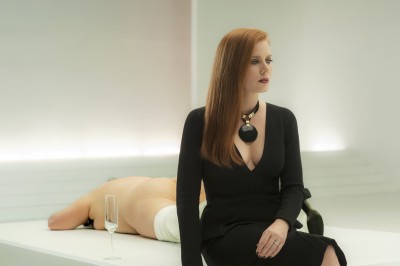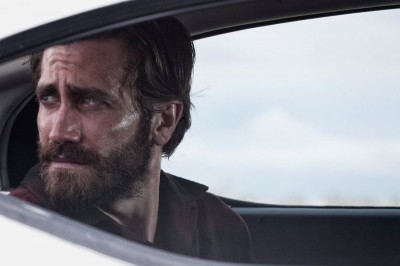| Reviews & Columns |
|
Reviews DVD TV on DVD Blu-ray 4K UHD International DVDs In Theaters Reviews by Studio Video Games Features Collector Series DVDs Easter Egg Database Interviews DVD Talk Radio Feature Articles Columns Anime Talk DVD Savant Horror DVDs The M.O.D. Squad Art House HD Talk Silent DVD
|
DVD Talk Forum |
|
|
| Resources |
|
DVD Price Search Customer Service #'s RCE Info Links |
|
Columns
|
|
|
Nocturnal Animals
Focus Features // R // November 18, 2016
List Price: Unknown [Buy now and save at Fandango]

Fashion designer Tom Ford shocked movie audiences with his directorial debut A Single Man for its tender use of dramatic romance. Seven years later, he would send a very different set of shockwaves through the film festival circuit with an adaptation of Austin Wright's Tony and Susan, which would come to be titled Nocturnal Animals for the silver screen. It's a dramatic thriller with a stellar cast that has no problem taking audiences to the darkest of places one can imagine. However, it didn't quite put me under the same spell that many others fell for on the film festival trails.
Susan Morrow (Amy Adams) is an art gallery owner, who has an abundance of riches and an attractive husband (Armie Hammer), yet remains incredibly unhappy in life. When she suddenly receives her ex-husband's (Jake Gyllenhaal) novel that has been dedicated to her, she begins to read and interpret its meaning into their failed marriage.
There are multiple main stories that take place in Nocturnal Animals, all of which connect back to her relationship with her ex-husband, Edward. The film begins by introducing us to Susan's current state in life, as she seems to have everything, except happiness. Her beautiful home and expensive dresses aren't enough to fill the void of a loveless marriage. While this is where the reality of the narrative takes place, it's most certainly the least developed. Despite the fact that the film is explored from Susan's perspective, the character is one-dimensional. Some exposition is provided in the flashbacks that display a few crucial points in her relationship with Edward, although it isn't quite enough to make her a very compelling character. Even though this world is seen through Susan's eyes, Edward is more fitting as the film's lead. He's rarely on screen, although this is the role that experiences real change over the feature's duration.
The reason for Edward feeling more accessible is also rooted in the fact that we learn a great deal about his deepest emotions through the novel that he has dedicated to Susan. This is a story within the film's main narrative, which follows Tony and his family, as they drive an open highway late at night. After being harassed by a car with three creepy hooligans inside, they find themselves in the middle of nowhere with no cell reception. It has a striking similarity to something one would see out of any horror anthology series. The further that we get into this incredibly dark and violent story, the more parallelism that is utilized between reality and this fictional novel. There's a fair amount of depth in the subtext that provides quite a bit of context to what we have been seeing in Susan's reality, especially as the the audience is seeing this story from how she imagines it's unfolding. There's no denying that this is the more substantial narrative.
The third act connects all of the dots in a more literal way between the two stories. Tom Ford's screenplay successfully conveys its message without actually saying much, which is impressive. However, it doesn't quite manage to leave an impact worthy of a two-hour running time, as it's clear that this film wishes to be much more than it is. The final scene certainly leaves the audience on an interesting note that says a million words in its silence, yet it still feels like there's so much hidden in the subtext that it lessens the overall impact of the feature. While we constantly learn more about Edward through the novel, the female characters are left as caricatures. This could be the fault of the source material, although it's a shame that the film couldn't have made them more engaging. Rather, they serve as plot devices to move the male arcs forward in ways that feel a bit exploitative.
Nocturnal Animals sports an impressive cast, all of which succeed in improving upon the screenplay. Amy Adams is exceptional as Susan, despite having to work with thin exposition. She commands the screen each time by displaying the character's depression and insomnia by the expression in her eyes. Jake Gyllenhaal is quite strong as Edward and Tony, as he remains convincing throughout. He shares a very believable chemistry with Adams, while boasting an outstanding performance as Tony in the novel's narrative. However, Michael Shannon proves to be a real gift as Bobby, who plays a police officer in the novel. He's remarkably charismatic, and hits all of the dramatic notes to perfection. This is a stellar cast that does a lot with the material.
There's no denying that Tom Ford has created a stylishly superb piece of cinema, but the central narrative and character are a bit too thin. The film's biggest issue is that the female characters are loosely drawn in favor of their male counterparts, including the lead. The film places its depth into its uses of parallelism and subtext, which will be lost upon some audiences. Nevertheless, this is a captivating and relentless two hours that never lets up on tension. While the film clearly wants to say more than it ever does, the final scene is a powerful way to leave audiences. Amy Adams, Jake Gyllenhaal, and Michael Shannon all deliver outstanding performances that radiate off the screen. Nocturnal Animals is an engaging, albeit superficial film with extreme highs and lows. Even so, it comes with a light recommendation.

|
| Popular Reviews |
| Sponsored Links |
|
|
| Sponsored Links |
|
|
| Release List | Reviews | Shop | Newsletter | Forum | DVD Giveaways | Blu-Ray | Advertise |
|
Copyright 2024 DVDTalk.com All Rights Reserved. Legal Info, Privacy Policy, Terms of Use,
Manage Preferences,
Your Privacy Choices | |||||||










